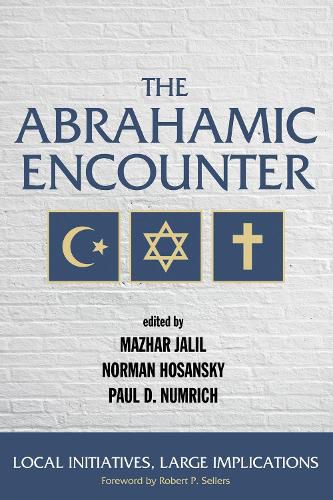Readings Newsletter
Become a Readings Member to make your shopping experience even easier.
Sign in or sign up for free!
You’re not far away from qualifying for FREE standard shipping within Australia
You’ve qualified for FREE standard shipping within Australia
The cart is loading…






This title is printed to order. This book may have been self-published. If so, we cannot guarantee the quality of the content. In the main most books will have gone through the editing process however some may not. We therefore suggest that you be aware of this before ordering this book. If in doubt check either the author or publisher’s details as we are unable to accept any returns unless they are faulty. Please contact us if you have any questions.
In these times of increasingly contentious politics and uncivil discourse in the United States, the ongoing encounter of adherents of the Abrahamic faiths in the American heartland offers a model of positive interfaith relations. Edited by a Muslim, a Jew, and a Christian, this volume describes the three goals of the Central Ohio Abrahamic encounter: Enhancing mutual understanding and relationships, disseminating accurate information about the three major Abrahamic traditions (Judaism, Christianity, and Islam), and contributing to the general betterment of society. Here is a local story that can inform–even inspire–other communities across the country and around the globe. Topics include beliefs, scripture and interpretation, historical illustrations and legacies, contemporary challenges and possibilities, and group dynamics, especially majority-minority relationships among American Christians, Jews, and Muslims. This volume will appeal to the growing audience for interfaith resources. The inclusion of several essays by noted religious scholars and leaders, chosen for their significance to the Central Ohio Abrahamic encounter, sets this volume apart from other publications on local initiatives. It is well suited for individual or group study in churches, synagogues, mosques, and interfaith organizations, and can be assigned for undergraduate and graduate/seminary courses on Abrahamic relations or interfaith relations generally.
$9.00 standard shipping within Australia
FREE standard shipping within Australia for orders over $100.00
Express & International shipping calculated at checkout
This title is printed to order. This book may have been self-published. If so, we cannot guarantee the quality of the content. In the main most books will have gone through the editing process however some may not. We therefore suggest that you be aware of this before ordering this book. If in doubt check either the author or publisher’s details as we are unable to accept any returns unless they are faulty. Please contact us if you have any questions.
In these times of increasingly contentious politics and uncivil discourse in the United States, the ongoing encounter of adherents of the Abrahamic faiths in the American heartland offers a model of positive interfaith relations. Edited by a Muslim, a Jew, and a Christian, this volume describes the three goals of the Central Ohio Abrahamic encounter: Enhancing mutual understanding and relationships, disseminating accurate information about the three major Abrahamic traditions (Judaism, Christianity, and Islam), and contributing to the general betterment of society. Here is a local story that can inform–even inspire–other communities across the country and around the globe. Topics include beliefs, scripture and interpretation, historical illustrations and legacies, contemporary challenges and possibilities, and group dynamics, especially majority-minority relationships among American Christians, Jews, and Muslims. This volume will appeal to the growing audience for interfaith resources. The inclusion of several essays by noted religious scholars and leaders, chosen for their significance to the Central Ohio Abrahamic encounter, sets this volume apart from other publications on local initiatives. It is well suited for individual or group study in churches, synagogues, mosques, and interfaith organizations, and can be assigned for undergraduate and graduate/seminary courses on Abrahamic relations or interfaith relations generally.